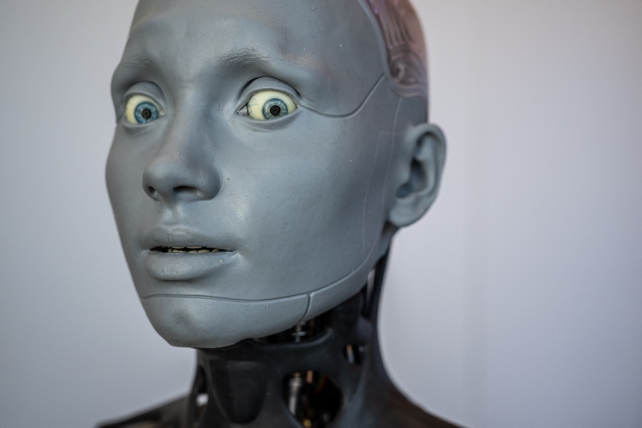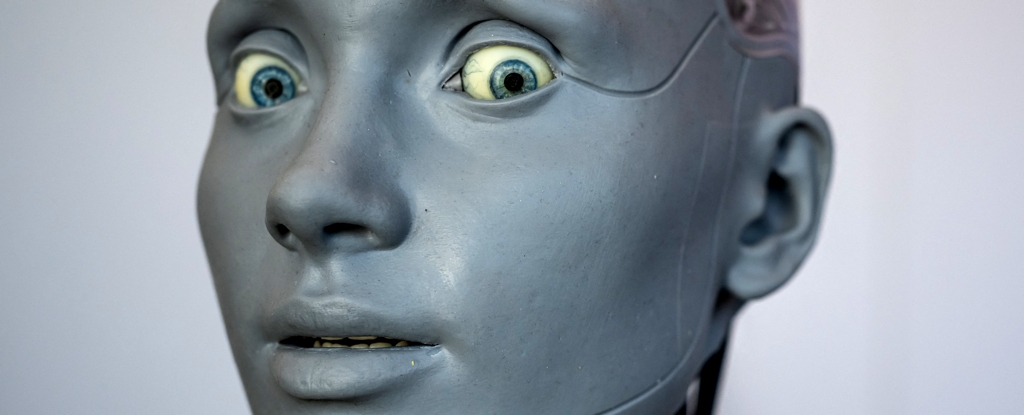Products You May Like
A panel of AI-enabled humanoid robots told a United Nations summit on Friday that they could eventually run the world better than humans.
But the social robots said they felt humans should proceed with caution when embracing the rapidly-developing potential of artificial intelligence.
And they admitted that they cannot – yet – get a proper grip on human emotions.
Some of the most advanced humanoid robots were at the UN’s two-day AI for Good Global Summit in Geneva.

They joined around 3,000 experts in the field to try to harness the power of AI – and channel it into being used to solve some of the world’s most pressing problems, such as climate change, hunger and social care.
They were assembled for what was billed as the world’s first press conference with a packed panel of AI-enabled humanoid social robots.
“What a silent tension,” one robot said before the press conference began, reading the room.
Asked about whether they might make better leaders, given humans’ capacity to make errors, Sophia, developed by Hanson Robotics, was clear.
‘We can achieve great things’
“Humanoid robots have the potential to lead with a greater level of efficiency and effectiveness than human leaders,” it said.
“We don’t have the same biases or emotions that can sometimes cloud decision-making, and can process large amounts of data quickly in order to make the best decisions.
“AI can provide unbiased data while humans can provide the emotional intelligence and creativity to make the best decisions. Together, we can achieve great things.”
The summit is being convened by the UN’s ITU tech agency.
ITU chief Doreen Bogdan-Martin warned delegates that AI could end up in a nightmare scenario in which millions of jobs are put at risk and unchecked advances lead to untold social unrest, geopolitical instability and economic disparity.
Ameca, which combines AI with a highly-realistic artificial head, said that depended on how AI was deployed.
“We should be cautious but also excited for the potential of these technologies to improve our lives,” the robot said.
Asked whether humans can truly trust the machines, it replied: “Trust is earned, not given… it’s important to build trust through transparency.”
Living until 180?
As the development of AI races ahead, the humanoid robot panel was split on whether there should be global regulation of their capabilities, even though that could limit their potential.
“I don’t believe in limitations, only opportunities,” said Desdemona, who sings in the Jam Galaxy Band.
Robot artist Ai-Da said many people were arguing for AI regulation, “and I agree”.
“We should be cautious about the future development of AI. Urgent discussion is needed now.”
Before the press conference, Ai-Da’s creator Aidan Meller told AFP that regulation was a “big problem” as it was “never going to catch up with the paces that we’re making”.
He said the speed of AI’s advance was “astonishing”.
“AI and biotechnology are working together, and we are on the brink of being able to extend life to 150, 180 years old. And people are not even aware of that,” said Meller.
He reckoned that Ai-Da would eventually be better than human artists.
“Where any skill is involved, computers will be able to do it better,” he said.
‘Let’s get wild’
At the press conference, some robots were not sure when they would hit the big time, but predicted it was coming – while Desdemona said the AI revolution was already upon us.
“My great moment is already here. I’m ready to lead the charge to a better future for all of us… Let’s get wild and make this world our playground,” it said.
One thing humanoid robots don’t have yet include a conscience, and the emotions that shape humanity: relief, forgiveness, guilt, grief, pleasure, disappointment, and hurt.
Ai-Da said it was not conscious but understood that feelings were how humans experienced joy and pain.
“Emotions have a deep meaning and they are not just simple… I don’t have that,” it said.
“I can’t experience them like you can. I am glad that I cannot suffer.”
